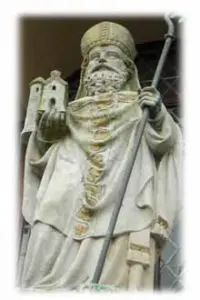
Image source: Cloyne Parish | East Cork, Ireland
Material source distilled from Omnium Sanctorum Hiberniae
Saint Colman was originally a pagan called Mac Lenine, who was later to convert and become the founder of a monastery. Mac Lenine was of royal descent and he was born around the early 500’s A.D.
Mac Lenine, was brought up as a heathen, and adopted the profession of bard. He became attached to the court of the King of Cashel, in Tipperary. Mac Lenine was musically employed with duties as a historian and poet. His job was to record the deeds of the king, good, bad or indifferent. He registered the genealogies and privileges of noble families, together with the bounds and limits of their lands and territories. Mac Lenine was engaged in such activities for about the forty-eighth year of his life. It was at the request of St. Ita, the Mary of Munster, that St. Brendan, went to meet Mac Lenine, and insist that he become a Christian ” God has called thee to salvation, and thou shalt be as an innocent dove in the sight of God.” The seeds of conversion were sown…
Around 550 A.D. a royal dispute for the throne of Cashel took place between Aodh-dubh and Aodh-caomh. Saint Brendan of Clonfert and Mac Lenine intervened. A compromise was reached in which Aodh-caomh was acknowledged as king of Cashel and the first Christian king of that kingdom. As it happened around the same timeframe, a stolen relics of Saint Ailbe (live rock) of Emly of great value, was discovered by the historian Mac Lenine. From that providential find, and at the behest of St. Brendan, he became a Christian and took the name of Colman.
St. Brendan says that this Colman, son of Lenin, was distinguished amongst the saints by his life and learning. St. Colman was endowed with extraordinary poetic skill, being dubbed by his contemporaries as the “Royal Bard of Munster”. Several of his Irish poems are still extant, notably a metrical panegyric on St. Brendan. A historian type figure, Colgan, attributes to Colman a metrical life of St. Senan.
Colman was granted land in East Cork and with this, he became first Abbot of his newly established monastery at Cloyne in 560 A.D. Colman laboured for more than forty years on his extensive monastic estate. He became bishop and Cloyne became a great centre of ecclesiastical power. This monastic centre was later to be re-established as the seat of the diocese of Cloyne after the synods of Rath Breasail and the synod of Kells. Today the old cathedral is now in the hands of the Church of Ireland, and is in need of repair. The current seat of the Catholic diocese is now based in Cobh, near Cork city.
We conclude now as we think of the many people in Ireland today who like our former Mac Lenine, are well educated, but may lack knowledge of the one true God. We therefore ask Saint Colman to intercede for these poor souls to come to know and revere Jesus as their personal saviour and King. We ask Our lady to direct our steps in finding the lost sheep for the glory of God and the salvation of souls.
We remember St. Colman of Cloyne on the 25th November